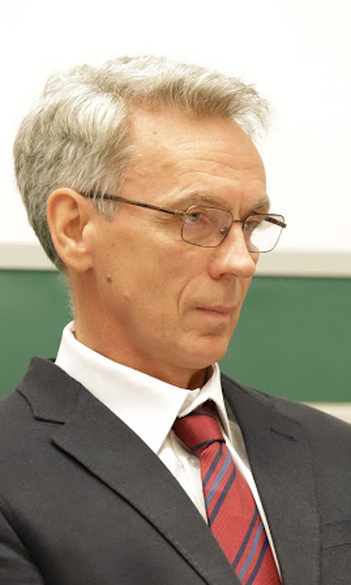Department of Ukranian Studies
Department of Ukrainian Studies

Dr. habil. Róbert Kiss Szemán, Head of Department
Address: 1088 Budapest, Múzeum krt. 4/D, Room 102
Office hours: Tuesday 12:00 PM – 1:00 PM
E-mail: kiss.szeman.robert@btk.elte.hu
About our department
The Department of Ukrainian Studies is one of the departments making up the Institute of Slavonic and Baltic Philology at ELTE’s Faculty of Humanities, along with the Department of Slavonic Studies, the Department of Polish Studies and the Department of Russian Language and Literature. Our institute is the only Slavic education centre and academic workshop in Europe dedicated to the teaching and research of all Slavic languages and literature except Sorbian.
The Department of Ukrainian Studies offers BA (Ukrainian specialisation in Slavonic studies) major and minor courses as well as an MA course (Ukrainian language and literature). It is also possible to obtain a PhD in Ukrainian linguistics, literature and culture in the programmes of the Doctoral School of Literary Studies or the Doctoral School of Linguistics. The Department of Ukrainian Studies has also accredited the course in Ukrainian and ethnic Ukrainian language and culture for teachers within the framework of the undivided teacher training programme.
In cooperation with the Department of Translation and Interpreting of ELTE’s Faculty of Humanities, the Institute of Slavonic and Baltic Philology offers a specialist postgraduate translation and interpreting course (Slavic and Baltic languages). The two-semester programme is open to candidates with a master’s in any field and a higher level of language proficiency, including in Ukrainian.
The Department of Ukrainian Studies does everything it can to ensure that these programmes are delivered to a high standard, to modernise them and to enhance the development of teaching materials.
Besides teaching, department staff pay great attention to talent management and to the cultivation of young people. Students may play an active role in academic life by attending conferences, seminars, workshops and summer camps. They also have the opportunity to win an academic scholarship (even abroad). All these activities can help prepare students for a successful career as a teacher or researcher. Like any degree in humanities, a BA in Ukrainian Studies opens up many opportunities on the labour market.
Graduates in Ukrainian Studies include diplomats and university academics, while others have taken on roles in the world of business, media and public administration. One graduate from the Ukrainian Studies programme is Gábor Körner, a literary translator and winner of the Attila József Prize, who has translated several works by contemporary Ukrainian authors from Ukrainian into Hungarian. Another graduate is Balázs Forgács, who has recently been ordained a priest by Cardinal and Primate Péter Erdő in the Basilica of Esztergom. During his studies, Balázs also translated a 19th century Ukrainian novella into Hungarian on his own initiative.
In addition to teaching, the staff of the Department of Ukrainian Studies also devote considerable time and energy to academic work and research. Despite the modest headcount, the academic work of the department’s staff is of great importance within the Institute of Slavonic and Baltic Philology. The staff regularly attend national and international conferences and congresses. This is also reflected in their numerous and regular publications in national and international journals and conference proceedings. The research areas of the department’s staff include: Slavic-Hungarian linguistic and cultural relations, Slavic accentology, Ukrainian dialectology, Ukrainian and comparative phraseology, Ukrainian literature, literary onomastics, Ukrainian culture, interpreting, translation, literary translation analysis and the teaching of Ukrainian as a foreign language.
The Department of Ukrainian Studies has established extensive international relations. Our staff work extensively with their national and international colleagues. The department has cooperated professionally for many years with the centres of Ukrainian, Rusyn, Russian and Slavonic Studies in Kiev, Chernivtsi, Zhytomyr, Lviv, Uzhhorod, Berehove, Vienna, Novi Sad, Prešov, Belgrade, Greifswald, Warsaw, Krakow and Bratislava.

